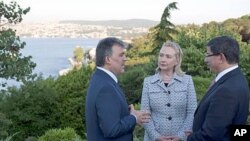Turkey hopes its role as the only predominately Muslim country in NATO, and its ties to African and Middle Eastern nations, will help it forge a peaceful future for Libya.
Istanbul was host to the latest meeting Friday of the so-called Libyan contact group. Officials from more than 20 countries, including the foreign ministers from France and Britain, and the U.S. Secretary of State, met with the Libyan opposition.
Turkey is playing a big role behind the scenes as Western nations joined together to recognize Libya's opposition Transitional National Council as the “legitimate governing authority" in the nation.
Selcuk Unal, a Turkish Foreign Ministry spokesman, said Turkey hopes to agree on an approach to force out Libyan leader Moammar Gadhafi and to set out what will follow after his removal.
"Currently there are two road maps, which are being referred to and being discussed," said Unal. "Firstly, one is the Turkish road map and the other is the African Union."
He gave no details of the Turkish plan, but one path that Istanbul proposed in April included an immediate cease-fire and steps toward a democratic transition.
Despite being a member of NATO, Turkey has opposed the NATO-led military operation in Libya. But it has taken a very active role in trying to find a peaceful end to the fighting there, which began in March when Libyan forces cracked down on opposition protesters.
"We intend to focus on a possible political solution," said Unal. "That is why we will hear from the U.N. Secretary General's Special Representative for Libya, Mr. Ali Hatip, about his contacts with Tripoli, Mr. Gadhafi's administration, and opposition representatives in Benghazi."
The contact group meeting, the fourth of its kind, has been expanded to include key African countries, including Ethiopia and Senegal.
The Turkish hosts were disappointed, though, when both Russia and China declined invitations to attend. Moscow and Beijing have been strong critics of the U.N.-sanctioned military operations against the Libyan leader.
Turkey Hopes to Help Bring Peaceful Future to Libya
- By Dorian Jones
















